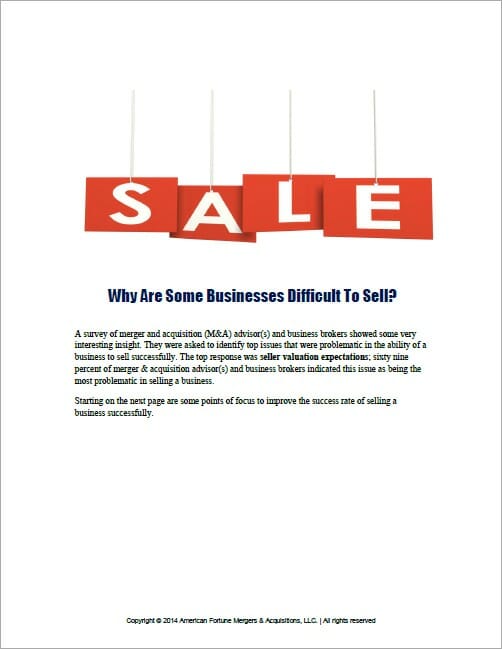Why There are Different Business Valuation Approaches
Fair market business value refers to the price at which a business would change hands between a willing buyer and a willing seller. This value starts with the notion that the buyer is not under any compulsion to buy, and the seller is not pushed to sell. The general idea is that both the buyer and seller have all the relevant facts, and both seek their maximum self-interest.
Essentially, fair market value should represent what would happen if the buyer and seller both seek their maximum benefits from the deal and don’t have any pressing issues pushing them to buy or sell.
Fair market value is one of many business valuation approaches. For private companies, the fair market approach may not be an option. Instead, private companies would seek out different valuation methods that consider other factors such as:
- Financial strength
- Profitability
- Strength within their industry
- Competitiveness
- Future viability
- And more.
The three most frequently used valuation methods for private companies include:
- Asset-Based Value Approach
- Market Approach
- Income Approach
Asset-Based Valuation Approach
The Asset-based valuation is sometimes called the cost-approach. This type of valuation aims to establish the value of the business’s assets. Then it attempts to adjust that value to reflect fair market value. This approach allows private companies to develop a valuation that is representative of potential fair market value, which is what many business owners hope to achieve.
Asset-based valuations use the following steps:
- Determine the book value of each asset (less depreciation costs)
Use face value or inventory values for assets, cash, and marketable securities.
- Adjust those values to reflect fair market value
- Evaluate the adjusted book value
- Deduct liabilities
An asset-based valuation isn’t always the best approach because it may oversimplify some assets. It may also not assess some factors such as prospective earnings or overcomplicating values of resources.
This approach is the closest that many companies can get to establishing a “book value.” The reason for this is because it uses the adjustment to represent fair market value.
Pros of Asset-Based Valuation
The reason why so many companies use an asset-based valuation is that they’re concerned about liquidity. This approach allows companies to evaluate the value of their assets directly, regardless of some elements such as intellectual property.
Additionally, this valuation method often works well for the investment niche. Financial and real estate investors can use the asset-based valuation. They often benefit because it subtracts the liabilities the company carries.
Finally, many private companies will use this valuation method when conducting due diligence. They help to quantify the liquidation or sale value of the business.
Cons of Asset-Based Valuation
There are two primary downfalls of this valuation type. The first is that it doesn’t consider prospective earnings. For example, if a business was up-and-coming, but the owner needed to sell, it may have more liabilities and not carry much value in assets. However, it may make up for that in anticipated earnings. That company may have a reasonable and reliable growth streak and bring much more value to the buyer in the upcoming months.
Not accounting for potential earnings is the first challenge. The second is the complexity of measuring intangible resources and internally generated products. Many sub-par business valuation generators or services will use the balance sheet to identify asset costs and liabilities. The balance sheet does not cover critical factors, including intangible assets. It also does not accurately represent the company at the time of the listing.
The asset-based valuation may not include valuable elements of a company such as branding, intellectual property, copyrights, patents, and more.
A business valuation expert should review your company’s assets, liabilities, and intangible assets to determine if the asset-based valuation is right for you.
Market Value Approach
The market value approach is among the most common because it establishes fair market value based on the sale price of similar assets. Typically business valuation experts will conduct extensive research to analyze the purchase price of similar businesses already on the market.
The market value approach established what people are willing to pay. Not necessarily the worth of the assets or potential of the business.
Conducting a market value approach involves:
- Assess financial ratios to compare against other companies
- Developing a set of multiples for the valuation
- Establishing a 12 to 36-month earning period
- Compare against similar companies on the market or recently sold
Typically owners will use this approach to establish an asking price or justify the owner’s needs in a dispute or buyout. Additionally, a market value approach can establish defensibility in the event of a legal dispute or issue with tax authorities.
Pros of Market Value
Of the various business valuation approaches, the market value approach is generally easy to apply. You set an earning period, compare it to other businesses for sale or recently sold, and use an appropriate multiple. The challenge is in finding private company market data.
Many legal authorities, tax authorities, and even potential buyers favor this valuation approach because it relies on real-world transactions. It is easy for those involved in buying and selling businesses to become skeptical when they see suggested or “estimated” values.
What pulls most people toward this approach is that it generally represents what people are willing to pay. The trouble with this concept is that it deviates from the idea behind the fair market value. It can call upon the seller to compromise on their needs during the sale.
Cons of Market Value
The primary issue with the market value approach is unique from all the other business valuation approaches. The data may be impossible to access, questionable, or outright unreliable.
Private company market data is usually private. Public companies have more license in assessing their value through public comparables transactions. However, private companies may find that they can’t identify any on the market or recently sold companies that are similar to theirs and have publicly available market data.
A market value approach can certainly help a business when entering the market. It can help the owner and broker establish an asking price and even build some defensibility if they can access and use reliable data.
Income Value Approach
The income value approach is not as straightforward as the other business valuation approaches. Several methods are available for using this approach, although they all use some selected level of earnings and a corresponding conversion factor. When appropriately applied, each technique should result in a similar value.
Ultimately this method should represent the net present value of future benefits. Those future benefits would be what the future owner would gain, so the approach establishes a discounted or capitalized rate to estimate the risk.
Two Types of Income Valuation
The two most common methods for the income valuation are the Discounted Cash Flow (DCF) and the Multiple of Discretionary Earnings approach.
The Multiple of Discretionary Earnings approach calls for:
- Determining the discretionary earnings that will likely recur in the future by averaging past years or using the last 12 months. These are the company’s pre-tax earnings, plus the owner’s salary, interest expense, personal expenses processed through the business, and depreciation.
- Select the multiplier appropriate for the business.
- Apply the multiplier to the discretionary earnings value to produce the value of the business.
The Discounted Cash Flow method uses a formula to calculate the sum of future discounted cash flows while estimating the fair value to accommodate risk. The equation brings those future figures or potential cash flows into present-day value based on an expected compounded return rate.
Pros of Income Valuations
This stance among the options of business valuation approaches works best for stable and mature businesses. Unlike the other two strategies discussed above, this method can help long-time business owners produce a reasonable value for their business.
This method also works well for companies that have uneven growth. Perhaps your business developed a winning product as a startup, and then you plateaued as many starts ups do. Then, years later, you had another surge in growth. Income valuations rely on the tested and proven and then apply that to the future, which serves mature or unevenly growing businesses well.
Cons of Income Valuations
There are some challenges as with all of the different types of business valuation approaches. The income valuation method uses a fair amount of estimation, which can make it difficult to defend. It also calls for professional judgment throughout the valuation process. The valuation may be debatable, but it can undoubtedly establish what a seller should expect and help potential buyers gauge risk and opportunity.
Choose from Different Business Valuation Approaches with an Expert
Business valuations are always a complicated process, no matter which of the business valuation approaches suits your company. Consulting with a professional business valuation expert can help you assess which valuation option best fits your business’ needs. These experts have the technical know-how and business experience to identify and apply the appropriate valuation technique.
A business valuation professional will have an in-depth understanding of current tax laws, corporate finance, and market conditions. The goal is to establish a defensible and unbiased business valuation that will set a benchmark to minimize owner disputes. There are a variety of business valuation services available, depending on what the owner needs. Some owners use a valuation to identify ways to improve the company’s value before selling it after making internal corrections. Other owners require a valuation because they are ready or need to sell now.
Contact American Fortune Business Valuation Services to meet with a professional business valuation expert to discuss your needs. Our team works to help owners understand how to value their businesses properly and cultivate a credible and defensible valuation.
Depend on American Fortune for counsel on proper Business Valuation Approaches. We have valued businesses in the following locations: Columbus Ohio, Atlanta Georgia, Lexington Kentucky, Bowling Green Kentucky, Nashville Tennessee, Memphis Tennessee, Cincinnati Ohio, Dayton Ohio, Toledo Ohio, Los Angeles, Cleveland Ohio, Pittsburgh Pennsylvania, Baltimore, Maryland, Indianapolis Indiana, Chicago Illinois, Detroit Michigan, Flint Michigan, Tampa Florida, St. Louis Missouri, Kansas City Kansas, Des Moines Iowa, Minneapolis Minnesota, Louisville Kentucky, Oklahoma City, Oklahoma, Dallas Texas, Fort Worth Texas, Denver Colorado, San Francisco California, Salt Lake City Utah, Phoenix Arizona, Lexington Kentucky, Los Angeles California, San Diego California.







